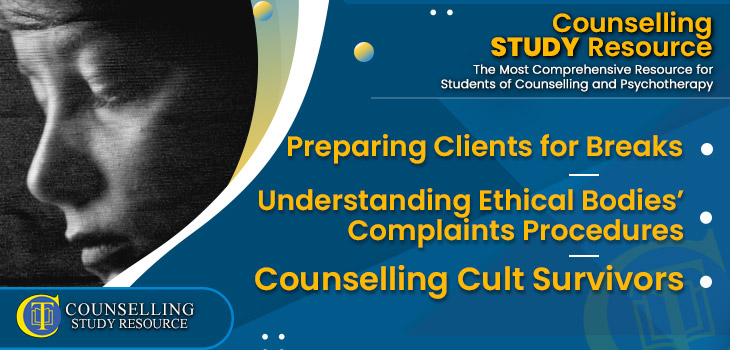259 – Counselling Cult Survivors
Preparing Clients for Breaks - Understanding Ethical Bodies’ Complaints Procedures
In Episode 259 of the Counselling Tutor Podcast, your hosts Rory Lees-Oakes and Ken Kelly are back with this week’s three topics:
- Firstly in ‘Theory in Practice’ we look at preparing your clients for breaks.
- Then in ‘Practice Today’, Rory and Ken discuss understanding your ethical body’s complaints procedures.
- And lastly in ‘Practice Matters’, Rory speaks with Claire Alison Hams on counselling cult survivors.
Preparing Clients for Breaks [starts at 03:25 mins]
Counselling Foundations is sponsored by
Counselling Skills Academy
Learn counselling techniques by seeing counselling skills used in real sessions by qualified therapists.
Real sessions - real-life presentations - real skills.
Taking breaks are an important part of your practice and self-care, listen as Rory and Ken mention some things to consider when it comes to taking your well-earned break:
- The quality of the therapeutic relationship is an indicator of positive outcome for the client – unexpected breaks risk damaging this relationship.
- How much notice should you give the client? You may want to do this as soon as you yourself know you’re going to be taking a break, alternatively, you should let the client know a week in advance for every month you’ve been working with them e.g. if you’ve been working with a client for three months, try to let them know about your break three weeks in advance.
- If your client is high risk, you may need a support plan in place e.g. having them see another counsellor in your absence.
- Reinforce your boundaries, don’t give out your phone number.
- If you decide to continue your counselling online during your break – speak to your supervisor, this is a decision that needs to be well thought out.
- Look out for some signs of dependency – is there building anxiety in the client as it gets closer to your break? Is the client bringing more and/or heavier material? Are their presentations escalating or are they showing signs of projection/transference?
- Acknowledge this – ask if this behaviour is due to your upcoming break and work through that with them.
- You may want to do some support mapping with your client.
- If you're in placement and something like this happens – speak to your practice manager.
A handout on Preparing for Client Breaks is available for download in the green button above.
Understanding Ethical Bodies’ Complaints Procedures [starts at 21:01 mins]
Looking into and understanding your ethical bodies complaint procedure is always a good idea – for both you and your client.
The main points of this section include:
- You’ll want to look into your ethical bodies complaint procedure so you can understand the mechanism of how a complaint is dealt with and the part you play in that.
- The more you know, the less you fear.
- Ethical bodies aren’t looking to punish when a complaint is received – they're looking to mediate, hear what is to be said on both sides, understand, look at your contract, etc.
- You might be able to use complaints to improve an area of your practice – take them as things you might work on.
- During the initial contracting with the client, give the client info on how they would go about making a complaint – this balances out the power right from beginning.
Counselling Cult Survivors [starts at 35:45 mins]
The National Counselling Society is proud to sponsor Practice Matters.
NCS are really excited to have launched their Children and Young People Therapist Register for counsellors working with the younger age group.
In this week’s ‘Practice Matters’, Rory speaks with Claire Alison Hams about counselling former cult members.
The key points of this discussion include:
- A characteristic of a cult might be a power imbalance within the community and coercive control – these create a sort of cultic dynamic that you might be able to recognise.
- Individuals should feel that they can leave safely – if there is fear either because they will lose a sense of community, their friends and family or if they fear for their safety, this is also an indicator of a cult or cult-like organization.
- When counselling cult survivors, the therapist should avoid using certain terminology with the client (such as cult) as this may be met with resistance.
- It’s important to be aware of the complexity of the control a client may be under.
- Gently help them to come to the conclusion for themselves, and support them through that.
- It can be painful and challenging for a client.
- The process is sometimes likened to waking up – being physically in/out and mentally in/out are both different things for the client and can feel like a huge loss.
- Clients who are cult survivors may struggle with freedom – finding their own identity.
- There may have been a pushing down of self, and they must now grow that.


